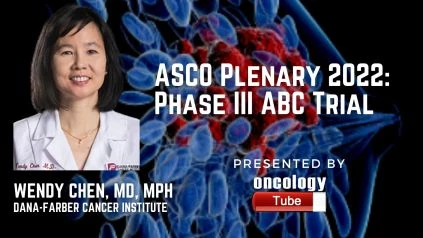Wendy Chen, MD, MPH, Assistant Professor, Medicine, Harvard Medical School, Senior Physician, Breast Oncology Center, Dana-Farber Cancer Institute. In this video, she speaks about ASCO Plenary 2022 – Abstract 360922: A randomized phase III, double-blinded, placebo-controlled trial of aspirin as adjuvant therapy for breast cancer (A011502): The Aspirin after Breast Cancer (ABC) Trial.
Â
Description in detail:
Â
In early-stage node-positive HER2 negative breast cancer patients, this is a randomized double-blind placebo-controlled phase III trial of aspirin (300 mg daily). Hormone Receptor status (HR positive vs HR negative), body mass index (30 vs 30 kg/m2), and stage will all be used to stratify patients (Stage II vs III).
Â
The major goal of this study is to see how aspirin compares to placebo in terms of invasive disease-free survival (iDFS).
Â
The primary goal The goal of this study was to see how aspirin (300 mg daily) compared to placebo affected invasive disease-free survival (iDFS) in patients with early-stage node-positive HER2 negative breast cancer.
Â
Supplementary goals
Â
In early-stage node-positive HER2 negative breast cancer patients, assess the effects of aspirin versus placebo on:
Â
Disease-free survival at a distance
Â
Overall, survival is possible.
Â
Cardiovascular disease (CVD) is a condition that affect (see Section11.3)
Â
The purpose of this study was to examine the toxicity of aspirin with placebo in individuals with early-stage node-positive HER2 negative breast cancer.
Â
The goal of this study was to see how well aspirin and placebo were tolerated by patients with early-stage node-positive HER2 negative breast cancer.
Â
To store tumor and germline deoxyribonucleic acid (DNA), plasma and urine taken at baseline, as well as sequential plasma and urine obtained 2 years later for future inflammatory marker measurements.
Â
To see if there are any subgroups of participants who benefit more from aspirin than placebo on the iDFS because of lifestyle characteristics linked to increased inflammation.
Â
Patients are tracked for up to ten years after enrolling in the trial.

